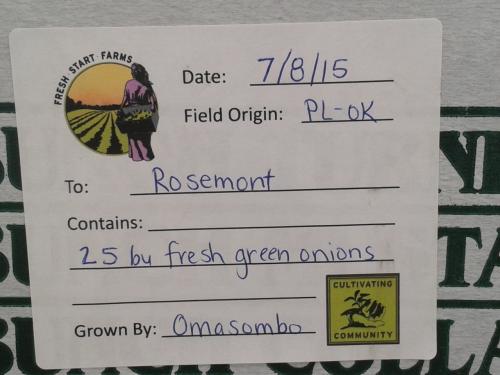Federal Policy Regional Impact
Northeast Sustainable Farm and Food System Priorities for 2017 Appropriations
Last month, NESAWG Policy Director Amy Little brought the message of supporting Northeast sustainable farm and food systems to Capitol Hill. Little joined farmers and sustainable agriculture proponents from around the country as part of the National Sustainable Agriculture Coalition’s series of farmer-fly-ins to advocate for funding sustainable agriculture programs in the 2017 federal budget.
Little met with the staff of two legislators from the NESAWG 12-state region who play a key role in deciding funding levels for sustainable agriculture and food system programs: Senator Patrick Leahy (D-VT) and Rosa DeLauro (CT-3).
The programs NESAWG is advocating for in the 2017 funding bill include key conservation, agricultural, and farmer support programs such the Conservation Stewardship Program (CSP), Agricultural Conservation Easement Program (ACEP), Environmental Quality Incentives Program (EQIP), Sustainable Agriculture Research and Education (SARE), Food Safety Outreach, Education, Training, and Technical Assistance competitive grants program (FSOP), the Outreach and Assistance to Socially Disadvantaged and Veteran Farmers and Ranchers Program (also known as the “Section 2501” program), and Value-Added Producer Grants (VAPG).
“These programs are not guaranteed funding, yet they are important to Northeast agriculture because we have so many small, diversified farms,” said Little. “We still have a chance to increase funding for these important programs in this last budget of the Obama Administration and we are asking for leadership from the Northeast Congressional Delegation in supporting sustainable farm and food systems in our region.”
Stories from the Northeast
NESAWG has been collaborating with our partner organizations to bring stories to legislators of how these programs benefit Northeastern farmers and support the development of sustainable agriculture and food systems in the Northeast.

“For decades, SARE has supported a broad range of farmer experience and experimentation to innovate new practices that have accelerated sustainable agriculture systems,” said Vernon Grubinger, Extension Professor at the University of Vermont and the Northeast SARE Coordinator. “This program has been instrumental in advancing sustainable farming techniques essential to our region such as cover cropping, management-intensive grazing, integrated pest management, and high tunnel production.”
The Section 2501 program, which provides grants to institutions and nonprofits working with underserved farmers and ranchers, has funded 15 projects in the Northeast in the past two funding cycles, out of 116 grants awarded in total. In 2014, NESAWG network participant Cultivating Community (Maine) won a grant to train socially disadvantaged farmers to operate successful farm businesses.
"Our 2501 grant helped us to provide direct training and technical assistance to farmers in our New American Sustainable Agriculture Project. In that sense it helped us provide critical land access, production training, and business planning and marketing support to dozens of farmers in Cumberland and Androscoggin Counties in Maine,” said Craig Lapine, Executive Director of Cultivating Community. "Just as importantly, the grant helped us build capacity within ethnic community-based organizations as well engage many of Maine’s agricultural service providers in conversations and trainings about how we can all be more effective in supporting socially disadvantaged farmers. As a result, Maine’s large and growing cohort of New American farmers is significantly more resourced and resilient than before. We’re excited because we think our model provides an example of how refugee and immigrant farmers can cross into and succeed in the agricultural mainstream.”

“For farmers in the Northeast, growing a business can be a challenge. Many of us farm on the urban edge, meaning land is very expensive, and our short seasons make it hard to find employees,” said Roger Noonan, President of the New England Farmers Union and a farmer in New Hampshire. “Farmers need to be thinking about diversifying their products into new markets, including the processed food market. VAPG allows us to explore opportunities for growth through feasibility grants and provides us with the funding necessary to get those business expansion ideas off the ground.”
The Agriculture Conservation Easement Program (ACEP) provides financial and technical assistance to help conserve and protect agricultural lands and wetlands and their related benefits. In the NESAWG 12-state region, there were 199 ACEP easements which enrolled a total of 9,790 acres in 2014.
“ACEP is critical for preserving the Northeast’s threatened agricultural land” said Cris Coffin, Policy Director at Land for Good. “It’s also an important tool for facilitating the transfer of farmland from one generation to the next. Thirty percent of New England’s farmers are age 65 and over, and the 1.4 million acres they manage is likely to change hands in the next 10-20 years. ACEP offers these farmers an avenue for accessing equity in their farm while protecting and passing their land on to a next generation farmer.”
Looking Ahead - The Appropriations Process
The Obama administration released their 2017 Budget Request in February, which Congress will consider as they determine their own funding bills this spring. For the first time during this administration, the President’s budget request included no cuts to farm bill mandatory funding for private lands conservation programs, including CSP and EQIP, and it also included several much-needed increases for other sustainable agriculture programs. NESAWG in partnership with NSAC and other organizations, is asking Congressional appropriators support the President’s proposed budget by not requesting any cuts to conservation programs, and by honoring his request for the following program increases: $5 million for food safety training (FSOP), $10 million to support minority, veteran, and socially disadvantaged farmers (Section 2501), and $5.3 million for sustainable agriculture research (SARE).
For more information on the Appropriations process, visit the National Sustainable Agriculture Coalition’s blog.
Photos: NESAWG Policy Director Amy Little meeting with Senator Leahy's staffer in Washington, D.C.; Researchers in Pennsylvania received a SARE grant to teach farmers how to cultivate forest-grown shittakes (photo credit: Northeast SARE); 2501 program support to Cultivating Community helped ensure that Maine’s New American farmers can access—and succeed in—Maine’s rich but competitive local foods marketplace. (photo credit: Sarah Bostick)
